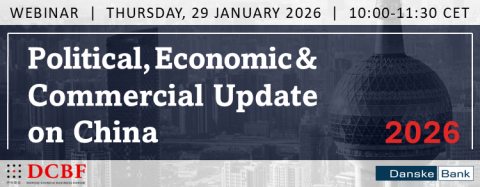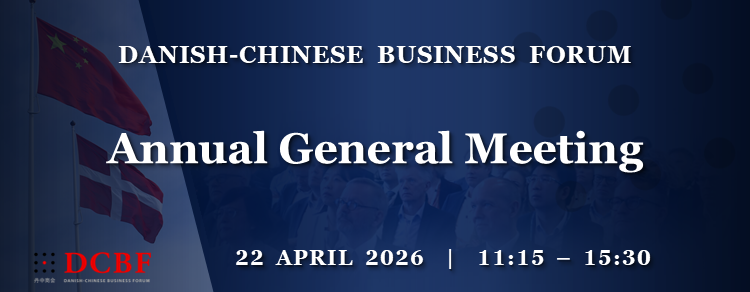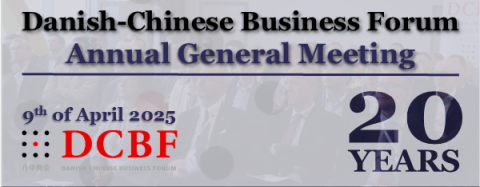
EVENTS
UPCOMING EVENTS
Annual General Meeting 2026
Date: April 22, 2026
Event: Annual General Meeting
Time: 11:15 - 15:30 CEST

Venue: AVK Danmark A/S
About the Event
Danish-Chinese Business Forum is pleased to annouce this year's Annual General Meeting (AGM), which will take place on Wednesday the 22nd of April, 2026. The AGM will be hosted by AVK Group in Galten near Aarhus.
The central theme of this year's AGM is EU-China relations. We have invited several distinguished speakers to provide updates on these topics, which will be announced in the week to come.
Additional details about the event will be shared as the date approaches.
(Only for Members of DCBF)
 Back
Back
Annual General Meeting 2026
Date: April 22, 2026
Event: Annual General Meeting
Time: 11:15 - 15:30 CEST

Venue: AVK Danmark A/S
About the Event
Danish-Chinese Business Forum is pleased to annouce this year's Annual General Meeting (AGM), which will take place on Wednesday the 22nd of April, 2026. The AGM will be hosted by AVK Group in Galten near Aarhus.
The central theme of this year's AGM is EU-China relations. We have invited several distinguished speakers to provide updates on these topics, which will be announced in the week to come.
Additional details about the event will be shared as the date approaches.
(Only for Members of DCBF)
PAST EVENTS
RESULTS (140)

Political, Economic & Commercial Update on China 2026
Date: January 29, 2026
Time: 10:00-11:30 CET
Event: Signature Event
Over the next five years, China will enter a phase of strategic recalibration shaped by the upcoming 15th Five-Year Plan. The policy direction for 2026-2030 is expected to emphasize technological self-reliance, enhanced national security measures, and a continued restructuring of the economy toward sustainable, innovation-driven growth. Meanwhile, global trade tensions, geopolitical uncertainty, and an intensifying tech race are creating new complexities for businesses and economies worldwide.
This webinar addresses a central question: What can Danish companies anticipate from China's policy agenda in 2026-2030, the period defined by the new Five-Year Plan?
Sign up for our annual webinar and gain up-to-date insights from our experts on the business environment, economic trends, and political developments shaping China over the coming half-decade.

"Reality check" - Interpreting the 15th Five-Year-Plan "proposition" as per the 20th Central Committee's 4th Plenum and anticipating shifts
Date: January 23, 2026
Time: 9:00-9:45 CET - 16:00-16:45 CST
Event: Supported Webinar
In the fifth session of the webinar series “Staying in Dialogue with China 2025/26”, Markus Herrmann Chen, Co-Founder and Managing Director, China Macro Group (CMG) will be talking to Yao Yang, Professor and Dean of the Dishuihu Advanced Finance Insitute, Shanghai University of Finance and Economics, and former Dean of Peking University's national School of Development (NSD).
This dialogue with leading Chinese economist Yao Yang will discuss the "Proposition" (建议) as endorsed by the Fourth Plenum of the CCP's 20th Central Committee. Held between the 20th and 23rd of October, 2025, it defined the policy substance that is now guiding the state bureaucracy to draft the national 15th Five-Year-Plan (2026-2030).
The 15th FYP will be deliberated, formally endorsed by the National People's Congress and published in the first half of March 2026. This dialogue is primarily targeting European business to provide a clearer sense of how the Chinese market and economy as a strategic business context for international business are evolving.
Key questions that will be discussed in this dialogue include:
- What the policy slogan "investing in people" (投资于人) really means
- How the "new-quality productive forces" as industrial policy framework succeeding Made-in-China 2025 are being planned
- Will there be a stronger emphasis on China's new growth drivers such as household consumption and service
- How China can increase its Total Factor Productivity
- If China's "anti-involution" measures show momentum
- What new and proactive wordings of China's agency and goals in foreign affairs mean
- and if there will be a general policy recalibration towards less emphasis on security compared to development interests
Join this webinar to help better anticipate key policy priorities and shifts of China's next Five-Year-Plan. Click here to read more and sign up!
About the Webinar Series:
This webinar is part of the webinar series 'Staying in Dialogue with China'. The series will bring you six webinars with distinguished China-based experts, concentrated between February 2025 and February 2026.
'Staying in dialogue with China' is organized and hosted by China Macro Group (CMG), with Caixin Global as Anchor Partner, in cooperation with China Europe International Business School (CEIBS), Chinaforum Bayern, Swissmem, Danish-Chinese Business Forum (DCBF), SwissCham China, the Stein am Rhein Symposium (stars), Norwegian Business Association China (NBA China), and EuroCham Singapore.

"Changes unseen in a century" - how Beijing sees foreign affair, geopolitics and geoeconomics as it drafts the 15th Five-Year-Plan
Date: October 09, 2025
Time: 9:00-9:45 CEST - 15:00-15:45 CST
Event: Supported Webinar
For the fourth webinar in the 2025 webinar series "Staying in Dialogue with China", China Macro Group will be joined by Prof. Yu Tiejun, President of the Institute of International and Strategic Studies (IISS), and Professor at the School of International Studies (SIS) at Peking University. As one of China's leading IR scholars, Prof. Yu is an influential domestic voice active both in public discourse and in the Chinese foreign policy community. In addition, his academic stints at MIT, Stanford, Harvard, and the University of Tokyo highlights his experiences engaging internationally.
About the Webinar
This webinar will offer a broad analysis of China’s foreign policy landscape, strategic priorities, and key risks ahead of the CCP’s “Fourth Plenum,” expected in October to set the outline of the 15th Five-Year Plan. Furthermore, China Macro Group will provide up-to-date insights to assist listeners and their businesses in developing informed approaches to strategy, planning, resilience, and investment decisions.
The following key topics will be covered:
- Current dynamics of critical bilateral relationships (China-US, China-EU and China-Russia).
- Security issues such as cross-strait relations and China's ambitions in global governance.
- China's agenda for "non-Western" and regional formats such as BRICS+ or the SCO.
- Important geoeconomic factors such as China's broader "self-reliance" policy and its use of export controls.
Take this opportunity to gain the latest insights ahead of China’s 15th Five-Year Plan through this timely webinar, and receive answers to your questions. Click here to read more and sign up!
About the Webinar Series:
This webinar is part of the webinar series 'Staying in Dialogue with China'. The series will bring you six webinars with distinguished China-based experts, concentrated between February and December 2025.
"Staying in dialogue with China" is organized and hosted by China Macro Group (CMG), with Caixin Global as Anchor Partner, in cooperation with China Europe International Business School (CEIBS), Chinaforum Bayern, Swissmem, Danish-Chinese Business Forum (DCBF), SwissCham China, the Stein am Rhein Symposium (stars), Sweden-China Trade Council (SCTC), Norwegian Business Association China (NBA China), EuroCham Singapore and China-Britain Business Council.

HQ-Subsidiary: Are the Existing Communication Structures optimal?
Date: August 26, 2025
Time: 13:00-15:00 CET
Event: Conference
DCBF is pleased to announce the second event in our Risk Seminar Series - this edition will explore the strategic implications of the growing decoupling between corporate headquarters (HQs) and China operations.
Recent reports highlight a growing operational disconnect between Danish headquarters (HQs) and their China subsidiaries – driven by localization, regulatory pressures, and reduced cross-border mobility. This misalignment is undermining collaboration, responsiveness, and global competitiveness.
- Manuel Dornetshuber, VP, Marketing and ComEx China & BD APAC, Coloplast Chronic Care
- Michael Madsen, Head of Transfer Pricing, Danfoss
About the event
Drawing on insights from senior executives at Coloplast and Danfoss, this seminar examines the risks of disengagement and siloed operations and discusses how Danish MNCs can recalibrate their strategies to strengthen cross-border collaboration, enhance trust, and maintain operational coherence.
At the heart of the discussion lies a fundamental question: What level of coordination, integration, and mutual understanding is required to ensure that HQs remain informed and agile, while enabling China-based teams to act effectively and autonomously?
The event will feature case examples, interactive dialogue, and practical reflections on:
- Communication structures that foster alignment across borders.
- The importance of trust-building, mobility, and long-term integration strategies.
- Organizational models that balance central control and local responsiveness.
For more information and registration, please send us a message at info@dcbf.dk.
About the Risk Seminar Series
Since COVID-19, companies have become increasingly aware of the organizational risks involved in operating globally, particularly in China. To support multinational companies in addressing these challenges, DCBF will host three targeted events in 2025, structured to progress from the micro to the macro level.

The “Taiwan issue” under Trump 2.0
Date: July 10, 2025
Time: 9:00-9:45 CEST - 15:00-15:45 CST
Event: Supported Webinar
About the Flash Webinar:
Before the summer holidays officially takes a hold on us, China Macro Group (CMG) will host a flash webinar on Thursday, July 10th 2025, 9 am CEST, to discuss the “Taiwan issue” under Trump 2.0.
From declarations at The Hague NATO Summit and Taiwan President Lai’s dialed-up rhetoric to the CCP’s new concept of “integrated or fused development” of Fujian province with Taiwan, TSMC’s new investment in the US, former Taiwan President Ma Ying-jeou’s track 2.0 diplomacy, and persisting PLA exercises around Taiwan:
-
What are the most important recent developments for European businesses doing cross-strait business?
-
What significance do these developments carry for the stability of cross-strait relations?
-
Which are the key analytical indicators to watch moving forward?
CMG Senior Advisor Frans-Paul van der Putten will moderate the webinar with Prof. Wu Yongping, Vice Dean of the School of Public Administration at Tsinghua University to provide in-depth analysis and expert perspectives on this complex and timely topic for interested participants.
This webinar will analyze and discuss key aspects of the evolving yet ever-complex “Taiwan issue” to support European and international business’ monitoring efforts and strategic decision-making regarding China and the Chinese market.
Take the opportunity to listen in and ask your questions to Vice-Dean Wu Yongping. Members of DCBF can register for free - Click here to sign up!
About China Macro Group:
CMG is a specialized European management consulting and research firm providing original, fact-based and calibrated China research and analysis to advise European corporate, investment and public sectors on strategic decision-making related to China and the Chinese market. CMG specializes in addressing management challenges shaped by developments in China’s political economy, international trade and market environment, ranging from strategy, footprint/organizational design, HQ-subsidiary interactions to strategic partnerships and negotiations.
In their research and analytical methodology, CMG integrates the four disciplines of: business/strategic management, public policy, macro-economy and international affairs.
Click here to learn more about CMG, and screen through their insightful primers and analyses (members of DCBF can read them for free).

"The Long View" - 10-Year Outlook Imagining CN in 2035 as the Next Key Modernization Milestone
Date: June 20, 2025
Time: 9:00-9:45 CEST - 15:00-15:45 CST
Event: Supported Webinar
In the third session of the 2025 webinar series “Staying in Dialogue with China”, which is dedicated to the theme of China's next and upcoming 15th Five-Year-Plan (2026-2030), Markus Herrmann Chen, Co-Founder and Managing Director, China Macro Group (CMG) will be talking to Zhang Dandan, Professor in Economics and Deputy Dean of the National School of Development (NSD) of Peking University.
Members of DCBF can register for free - Click here to read more and sign up!
About the Webinar
Amid China’s continuously difficult post-Covid economic recovery as well as persisting structural issues such as the real estate market, industrial overcapacity and local government debt, this webinar deliberately takes the “long view”, providing a 10-year outlook and imagining China in 2035 as the next key modernization milestone – the mid-term goal announced as part of the 14th Five-Year-Plan in March 2021. This has been only the second time a regular Five-Year-Plan takes a planning horizon beyond the regular five years, the previous one being the 6th Five-Year-Plan (1981-1985) which proposed goals for the four ensuing Five-Year-Plan periods until the end of the century with the goal of quadrupling China’s GDP.
By 2035, and by accomplishing the goals of the 15th and 16th Five-Year-Plans, Chinese planners seek to achieve the “basic socialist modernization” (基本实现社会主义现代化), which in its core wants to – again – double China’s GDP, over the period from 2020 to 2035, which assumes a sustained year-on-year average real growth of 4.7% GDP, plus increase the share of China’s middle income group from 35% to 50% as some of its most important policy goals.
The following key questions will be explored:
- How to understand current economic difficulties when seen from a long-term planning and structural reform perspective?
- In hindsight, how «radical» were the decisions adopted by the CCP’s “Third Plenum” in July 2024?
- Which parts of the 14th Five-Year-Plan have been most effectively implemented when measured against the respective ambition level?
- How should foreign business take into account a policy planning goal for 2035?
- What are the key “make-or-break” reforms to achieve the 2035 goal such as China’s demographic transition?
- NDRC stresses that “changes unseen in a century” must be duly considered in long-term planning, what long-term scenario(s) do planners use?
- What are key policy shifts and changes to be expected by the upcoming 15th Five-Year-Plan?
- Referring to the 20 KPIs of the 14th Five-Year-Plan, what new set of KPIs will be the “right” ones to help guide development up to 2035?
- What role do governmental research versus societal inputs (e.g. the citizen issue collection, 政民互动问题征集) play in long-term planning?
Take the opportunity to listen in and ask your questions to Vice-Dean Zhang Dandan.
About the Webinar Series:
This webinar is part of the webinar series 'Staying in Dialogue with China'. The series will bring you six webinars with distinguished China-based experts, concentrated between February and December 2025.
'Staying in dialogue with China' is organized and hosted by China Macro Group (CMG), with Caixin Global as Anchor Partner, in cooperation with China Europe International Business School (CEIBS), Chinaforum Bayern, Swissmem, Danish-Chinese Business Forum (DCBF), SwissCham China, the Stein am Rhein Symposium (stars), Sweden-China Trade Council (SCTC), Norwegian Business Association China (NBA China), Danish Chamber of Commerce in China (DCCC), EuroCham Singapore and China-Britain Business Council.

Managing Financial, Operational and Digital Communications
Date: June 17, 2025
Time: 14:00-16:00 CET
Event: Conference
Danish-Chinese Business Forum invites you to the opening event of a high-level seminar series on risk management.
About the event
As Danish companies evaluate the risks of operating in - and staying out of - China, this hybrid seminar will address critical aspects of financial, operational, and digital risk.
Attend in person in Aarhus, or join us online, to explore how communication structures can be strengthened to improve risk management, data security and corporate accountability.
The event is relevant for all professionals across sectors navigating organizational or multinational risk exposure in China.
Our speakers will present practical insights backed by experience and actionable case studies illustrating how inadequate operational systems and informal communication can result in data loss and ownership issues, and how supply chain audits can lead to improved compliance, alongside other examples.
For the first event at Arla Foods in Aarhus, we are pleased to welcome three expert speakers with firsthand experience in managing risk in China:
- Yael Farjun, China Deputy GM, PTL Group - “Mitigating Human and Financial Risks for Multinationals Operating in China.”
- Søren B. Jensen, Managing Director, Mictory Ltd. - “Visualizing Operational Risk for Strategic Clarity.”
- Niels Christian Flintholm, Partner, Leaf Digital - “De-risking Digital Communication.”
For more information and registration, please send us a message at info@dcbf.dk
About the Risk Seminar Series
Since COVID-19, companies have become increasingly aware of the organizational risks involved in operating globally, particularly in China. To support multinational companies in addressing these challenges, DCBF will host three targeted events in 2025, structured to progress from the micro to the macro level.

“Four years into 14th Five-Year-Plan" - taking stock of its execution after the NPC 2025
Date: April 23, 2025
Time: 9:00-9:45 CEST - 16:00-16:45 CST
Event: Supported Webinar
In the second session of the 2025 webinar series “Staying in Dialogue with China”, Markus Herrmann Chen, Co-Founder and Managing Director, China Macro Group (CMG) will be talking to Zhu Guangyao. Vice Chairman of CCIEE, and former Vice Minister of Finance, about China’s next and upcoming 15th Five-year Plan (2026-2030).
Members of DCBF can register for free - Click here to read more and sign up!
About the Webinar Series:
This webinar is part of the webinar series 'Staying in Dialogue with China'. The series will bring you six webinars with distinguished China-based experts, concentrated between February and December 2025.
'Staying in dialogue with China' is organized and hosted by China Macro Group (CMG), with Caixin Global as Anchor Partner, in cooperation with China Europe International Business School (CEIBS), Chinaforum Bayern, Swissmem, Danish-Chinese Business Forum (DCBF), SwissCham China, the Stein am Rhein Symposium (stars), Sweden-China Trade Council (SCTC), Norwegian Business Association China (NBA China), Danish Chamber of Commerce in China (DCCC), and EuroCham Singapore.
About the Webinar:
Against the backdrop of the 15th Five-Year-Plan (2026-2030) being drafted these months, this webinar wants to take stock of the implementations of the 14th Five-Year-Plan (2021-2025) to date, which was drafted in the first year of the Covid pandemic in 2020, endorsed by the NPC in 2021 and is now in its fifth and last year of execution.
This time period eventually witnessed, among many more, China’s real estate crisis, the 20th Party Congress, ASEAN becoming China’s largest trading partner, an aggravated level of insufficient demand and overcapacity in China’s economy, the end of Covid-related restrictions and the re-opening of its borders, Russia launching its war against Ukraine, the peaking of China’s population, new market governance dynamics shifting from tensions to reconciliation with China’s private sector, two US presidents, and finally the “Deep Seek” moment.
CMG wants to discuss the following key topics with their esteemed guest:
-
The strategic role and impact of the Dual Circulation policy concept
-
Highlight key challenges and key policymaking actions under the 14th Five-Year-Plan
-
Reform announcements at the “Third Plenum” (July 2024) and their implementation
-
China’s evolving external environment, incl. Trump 2.0 and US-China relations
-
China’s technological momentum, dependencies and ambitions
-
State and outlook of China’s post-Covid economic recovery
-
Changing premises and external factors for the 15th Five-Year-Plan
-
How are “supply” vs “demand” side each seen strategically by the Chinese leadership?
-
Are there structural levers or quick-wins to unleash more domestic demand to urgently and effectively revitalize the economy?
-
What is the role of China’s social security system to help unleash the domestic demand?
-
What is the link between domestic demand boost and “common prosperity”?
Join this wide-ranging discussion to get a strategic snapshot from a senior Chinese policymaker’s unique vantage point of where China’s development and its economy stand, as well as the key challenges and opportunities as seen by Beijing.

Annual General Meeting 2025
Date: April 09, 2025
Time: 14:20 - 19:00 CEST (Registration starts at 14:00)
Event: Annual General Meeting
Venue: FOSS Innovation Center.
About the Event
Danish-Chinese Business Forum is pleased to annouce this year's Annual General Meeting (AGM), which will take place 9th of April 2025. The AGM will be hosted by FOSS Analytical A/S at the FOSS Innovation Centre in Hillerød.
We are pleased to announce our two distinguished keynote speakers:
- H.E. Michael Starbæk Christensen, Ambassador of Denmark to the People's Republic of China
- H.E. Wang Xuefeng, Ambassador of the People's Republic of China to Denmark
Peter Foss, Chairman of the Board of Directors at FOSS Group, and Tom Behrens-Sørensen, Chairman of Danish-Chinese Business Forum will provide the welcome speeches.
This AGM will be particularly significant as it marks the 20th anniversary of the Danish-Chinese Business Forum's establishment - a milestone in fostering collaboration and growth. The central theme of this year's AGM is "Reflections and Future Trends: Mapping China's Next 20 Years."
(Only for Members of DCBF)
 Back
Back

Political, Economic & Commercial Update on China 2026
Date: January 29, 2026
Event: Signature Event
Over the next five years, China will enter a phase of strategic recalibration shaped by the upcoming 15th Five-Year Plan. The policy direction for 2026-2030 is expected to emphasize technological self-reliance, enhanced national security measures, and a continued restructuring of the economy toward sustainable, innovation-driven growth. Meanwhile, global trade tensions, geopolitical uncertainty, and an intensifying tech race are creating new complexities for businesses and economies worldwide.
This webinar addresses a central question: What can Danish companies anticipate from China's policy agenda in 2026-2030, the period defined by the new Five-Year Plan?
Sign up for our annual webinar and gain up-to-date insights from our experts on the business environment, economic trends, and political developments shaping China over the coming half-decade.
 Back
Back

"Reality check" - Interpreting the 15th Five-Year-Plan "proposition" as per the 20th Central Committee's 4th Plenum and anticipating shifts
Date: January 23, 2026
Event: Supported Webinar
In the fifth session of the webinar series “Staying in Dialogue with China 2025/26”, Markus Herrmann Chen, Co-Founder and Managing Director, China Macro Group (CMG) will be talking to Yao Yang, Professor and Dean of the Dishuihu Advanced Finance Insitute, Shanghai University of Finance and Economics, and former Dean of Peking University's national School of Development (NSD).
This dialogue with leading Chinese economist Yao Yang will discuss the "Proposition" (建议) as endorsed by the Fourth Plenum of the CCP's 20th Central Committee. Held between the 20th and 23rd of October, 2025, it defined the policy substance that is now guiding the state bureaucracy to draft the national 15th Five-Year-Plan (2026-2030).
The 15th FYP will be deliberated, formally endorsed by the National People's Congress and published in the first half of March 2026. This dialogue is primarily targeting European business to provide a clearer sense of how the Chinese market and economy as a strategic business context for international business are evolving.
Key questions that will be discussed in this dialogue include:
- What the policy slogan "investing in people" (投资于人) really means
- How the "new-quality productive forces" as industrial policy framework succeeding Made-in-China 2025 are being planned
- Will there be a stronger emphasis on China's new growth drivers such as household consumption and service
- How China can increase its Total Factor Productivity
- If China's "anti-involution" measures show momentum
- What new and proactive wordings of China's agency and goals in foreign affairs mean
- and if there will be a general policy recalibration towards less emphasis on security compared to development interests
Join this webinar to help better anticipate key policy priorities and shifts of China's next Five-Year-Plan. Click here to read more and sign up!
About the Webinar Series:
This webinar is part of the webinar series 'Staying in Dialogue with China'. The series will bring you six webinars with distinguished China-based experts, concentrated between February 2025 and February 2026.
'Staying in dialogue with China' is organized and hosted by China Macro Group (CMG), with Caixin Global as Anchor Partner, in cooperation with China Europe International Business School (CEIBS), Chinaforum Bayern, Swissmem, Danish-Chinese Business Forum (DCBF), SwissCham China, the Stein am Rhein Symposium (stars), Norwegian Business Association China (NBA China), and EuroCham Singapore.
 Back
Back

"Changes unseen in a century" - how Beijing sees foreign affair, geopolitics and geoeconomics as it drafts the 15th Five-Year-Plan
Date: October 09, 2025
Event: Supported Webinar
For the fourth webinar in the 2025 webinar series "Staying in Dialogue with China", China Macro Group will be joined by Prof. Yu Tiejun, President of the Institute of International and Strategic Studies (IISS), and Professor at the School of International Studies (SIS) at Peking University. As one of China's leading IR scholars, Prof. Yu is an influential domestic voice active both in public discourse and in the Chinese foreign policy community. In addition, his academic stints at MIT, Stanford, Harvard, and the University of Tokyo highlights his experiences engaging internationally.
About the Webinar
This webinar will offer a broad analysis of China’s foreign policy landscape, strategic priorities, and key risks ahead of the CCP’s “Fourth Plenum,” expected in October to set the outline of the 15th Five-Year Plan. Furthermore, China Macro Group will provide up-to-date insights to assist listeners and their businesses in developing informed approaches to strategy, planning, resilience, and investment decisions.
The following key topics will be covered:
- Current dynamics of critical bilateral relationships (China-US, China-EU and China-Russia).
- Security issues such as cross-strait relations and China's ambitions in global governance.
- China's agenda for "non-Western" and regional formats such as BRICS+ or the SCO.
- Important geoeconomic factors such as China's broader "self-reliance" policy and its use of export controls.
Take this opportunity to gain the latest insights ahead of China’s 15th Five-Year Plan through this timely webinar, and receive answers to your questions. Click here to read more and sign up!
About the Webinar Series:
This webinar is part of the webinar series 'Staying in Dialogue with China'. The series will bring you six webinars with distinguished China-based experts, concentrated between February and December 2025.
"Staying in dialogue with China" is organized and hosted by China Macro Group (CMG), with Caixin Global as Anchor Partner, in cooperation with China Europe International Business School (CEIBS), Chinaforum Bayern, Swissmem, Danish-Chinese Business Forum (DCBF), SwissCham China, the Stein am Rhein Symposium (stars), Sweden-China Trade Council (SCTC), Norwegian Business Association China (NBA China), EuroCham Singapore and China-Britain Business Council.
 Back
Back

HQ-Subsidiary: Are the Existing Communication Structures optimal?
Date: August 26, 2025
Event: Conference
DCBF is pleased to announce the second event in our Risk Seminar Series - this edition will explore the strategic implications of the growing decoupling between corporate headquarters (HQs) and China operations.
Recent reports highlight a growing operational disconnect between Danish headquarters (HQs) and their China subsidiaries – driven by localization, regulatory pressures, and reduced cross-border mobility. This misalignment is undermining collaboration, responsiveness, and global competitiveness.
- Manuel Dornetshuber, VP, Marketing and ComEx China & BD APAC, Coloplast Chronic Care
- Michael Madsen, Head of Transfer Pricing, Danfoss
About the event
Drawing on insights from senior executives at Coloplast and Danfoss, this seminar examines the risks of disengagement and siloed operations and discusses how Danish MNCs can recalibrate their strategies to strengthen cross-border collaboration, enhance trust, and maintain operational coherence.
At the heart of the discussion lies a fundamental question: What level of coordination, integration, and mutual understanding is required to ensure that HQs remain informed and agile, while enabling China-based teams to act effectively and autonomously?
The event will feature case examples, interactive dialogue, and practical reflections on:
- Communication structures that foster alignment across borders.
- The importance of trust-building, mobility, and long-term integration strategies.
- Organizational models that balance central control and local responsiveness.
For more information and registration, please send us a message at info@dcbf.dk.
About the Risk Seminar Series
Since COVID-19, companies have become increasingly aware of the organizational risks involved in operating globally, particularly in China. To support multinational companies in addressing these challenges, DCBF will host three targeted events in 2025, structured to progress from the micro to the macro level.
 Back
Back

The “Taiwan issue” under Trump 2.0
Date: July 10, 2025
Event: Supported Webinar
About the Flash Webinar:
Before the summer holidays officially takes a hold on us, China Macro Group (CMG) will host a flash webinar on Thursday, July 10th 2025, 9 am CEST, to discuss the “Taiwan issue” under Trump 2.0.
From declarations at The Hague NATO Summit and Taiwan President Lai’s dialed-up rhetoric to the CCP’s new concept of “integrated or fused development” of Fujian province with Taiwan, TSMC’s new investment in the US, former Taiwan President Ma Ying-jeou’s track 2.0 diplomacy, and persisting PLA exercises around Taiwan:
-
What are the most important recent developments for European businesses doing cross-strait business?
-
What significance do these developments carry for the stability of cross-strait relations?
-
Which are the key analytical indicators to watch moving forward?
CMG Senior Advisor Frans-Paul van der Putten will moderate the webinar with Prof. Wu Yongping, Vice Dean of the School of Public Administration at Tsinghua University to provide in-depth analysis and expert perspectives on this complex and timely topic for interested participants.
This webinar will analyze and discuss key aspects of the evolving yet ever-complex “Taiwan issue” to support European and international business’ monitoring efforts and strategic decision-making regarding China and the Chinese market.
Take the opportunity to listen in and ask your questions to Vice-Dean Wu Yongping. Members of DCBF can register for free - Click here to sign up!
About China Macro Group:
CMG is a specialized European management consulting and research firm providing original, fact-based and calibrated China research and analysis to advise European corporate, investment and public sectors on strategic decision-making related to China and the Chinese market. CMG specializes in addressing management challenges shaped by developments in China’s political economy, international trade and market environment, ranging from strategy, footprint/organizational design, HQ-subsidiary interactions to strategic partnerships and negotiations.
In their research and analytical methodology, CMG integrates the four disciplines of: business/strategic management, public policy, macro-economy and international affairs.
Click here to learn more about CMG, and screen through their insightful primers and analyses (members of DCBF can read them for free).
 Back
Back

"The Long View" - 10-Year Outlook Imagining CN in 2035 as the Next Key Modernization Milestone
Date: June 20, 2025
Event: Supported Webinar
In the third session of the 2025 webinar series “Staying in Dialogue with China”, which is dedicated to the theme of China's next and upcoming 15th Five-Year-Plan (2026-2030), Markus Herrmann Chen, Co-Founder and Managing Director, China Macro Group (CMG) will be talking to Zhang Dandan, Professor in Economics and Deputy Dean of the National School of Development (NSD) of Peking University.
Members of DCBF can register for free - Click here to read more and sign up!
About the Webinar
Amid China’s continuously difficult post-Covid economic recovery as well as persisting structural issues such as the real estate market, industrial overcapacity and local government debt, this webinar deliberately takes the “long view”, providing a 10-year outlook and imagining China in 2035 as the next key modernization milestone – the mid-term goal announced as part of the 14th Five-Year-Plan in March 2021. This has been only the second time a regular Five-Year-Plan takes a planning horizon beyond the regular five years, the previous one being the 6th Five-Year-Plan (1981-1985) which proposed goals for the four ensuing Five-Year-Plan periods until the end of the century with the goal of quadrupling China’s GDP.
By 2035, and by accomplishing the goals of the 15th and 16th Five-Year-Plans, Chinese planners seek to achieve the “basic socialist modernization” (基本实现社会主义现代化), which in its core wants to – again – double China’s GDP, over the period from 2020 to 2035, which assumes a sustained year-on-year average real growth of 4.7% GDP, plus increase the share of China’s middle income group from 35% to 50% as some of its most important policy goals.
The following key questions will be explored:
- How to understand current economic difficulties when seen from a long-term planning and structural reform perspective?
- In hindsight, how «radical» were the decisions adopted by the CCP’s “Third Plenum” in July 2024?
- Which parts of the 14th Five-Year-Plan have been most effectively implemented when measured against the respective ambition level?
- How should foreign business take into account a policy planning goal for 2035?
- What are the key “make-or-break” reforms to achieve the 2035 goal such as China’s demographic transition?
- NDRC stresses that “changes unseen in a century” must be duly considered in long-term planning, what long-term scenario(s) do planners use?
- What are key policy shifts and changes to be expected by the upcoming 15th Five-Year-Plan?
- Referring to the 20 KPIs of the 14th Five-Year-Plan, what new set of KPIs will be the “right” ones to help guide development up to 2035?
- What role do governmental research versus societal inputs (e.g. the citizen issue collection, 政民互动问题征集) play in long-term planning?
Take the opportunity to listen in and ask your questions to Vice-Dean Zhang Dandan.
About the Webinar Series:
This webinar is part of the webinar series 'Staying in Dialogue with China'. The series will bring you six webinars with distinguished China-based experts, concentrated between February and December 2025.
'Staying in dialogue with China' is organized and hosted by China Macro Group (CMG), with Caixin Global as Anchor Partner, in cooperation with China Europe International Business School (CEIBS), Chinaforum Bayern, Swissmem, Danish-Chinese Business Forum (DCBF), SwissCham China, the Stein am Rhein Symposium (stars), Sweden-China Trade Council (SCTC), Norwegian Business Association China (NBA China), Danish Chamber of Commerce in China (DCCC), EuroCham Singapore and China-Britain Business Council.
 Back
Back

Managing Financial, Operational and Digital Communications
Date: June 17, 2025
Event: Conference
Danish-Chinese Business Forum invites you to the opening event of a high-level seminar series on risk management.
About the event
As Danish companies evaluate the risks of operating in - and staying out of - China, this hybrid seminar will address critical aspects of financial, operational, and digital risk.
Attend in person in Aarhus, or join us online, to explore how communication structures can be strengthened to improve risk management, data security and corporate accountability.
The event is relevant for all professionals across sectors navigating organizational or multinational risk exposure in China.
Our speakers will present practical insights backed by experience and actionable case studies illustrating how inadequate operational systems and informal communication can result in data loss and ownership issues, and how supply chain audits can lead to improved compliance, alongside other examples.
For the first event at Arla Foods in Aarhus, we are pleased to welcome three expert speakers with firsthand experience in managing risk in China:
- Yael Farjun, China Deputy GM, PTL Group - “Mitigating Human and Financial Risks for Multinationals Operating in China.”
- Søren B. Jensen, Managing Director, Mictory Ltd. - “Visualizing Operational Risk for Strategic Clarity.”
- Niels Christian Flintholm, Partner, Leaf Digital - “De-risking Digital Communication.”
For more information and registration, please send us a message at info@dcbf.dk
About the Risk Seminar Series
Since COVID-19, companies have become increasingly aware of the organizational risks involved in operating globally, particularly in China. To support multinational companies in addressing these challenges, DCBF will host three targeted events in 2025, structured to progress from the micro to the macro level.
 Back
Back

“Four years into 14th Five-Year-Plan" - taking stock of its execution after the NPC 2025
Date: April 23, 2025
Event: Supported Webinar
In the second session of the 2025 webinar series “Staying in Dialogue with China”, Markus Herrmann Chen, Co-Founder and Managing Director, China Macro Group (CMG) will be talking to Zhu Guangyao. Vice Chairman of CCIEE, and former Vice Minister of Finance, about China’s next and upcoming 15th Five-year Plan (2026-2030).
Members of DCBF can register for free - Click here to read more and sign up!
About the Webinar Series:
This webinar is part of the webinar series 'Staying in Dialogue with China'. The series will bring you six webinars with distinguished China-based experts, concentrated between February and December 2025.
'Staying in dialogue with China' is organized and hosted by China Macro Group (CMG), with Caixin Global as Anchor Partner, in cooperation with China Europe International Business School (CEIBS), Chinaforum Bayern, Swissmem, Danish-Chinese Business Forum (DCBF), SwissCham China, the Stein am Rhein Symposium (stars), Sweden-China Trade Council (SCTC), Norwegian Business Association China (NBA China), Danish Chamber of Commerce in China (DCCC), and EuroCham Singapore.
About the Webinar:
Against the backdrop of the 15th Five-Year-Plan (2026-2030) being drafted these months, this webinar wants to take stock of the implementations of the 14th Five-Year-Plan (2021-2025) to date, which was drafted in the first year of the Covid pandemic in 2020, endorsed by the NPC in 2021 and is now in its fifth and last year of execution.
This time period eventually witnessed, among many more, China’s real estate crisis, the 20th Party Congress, ASEAN becoming China’s largest trading partner, an aggravated level of insufficient demand and overcapacity in China’s economy, the end of Covid-related restrictions and the re-opening of its borders, Russia launching its war against Ukraine, the peaking of China’s population, new market governance dynamics shifting from tensions to reconciliation with China’s private sector, two US presidents, and finally the “Deep Seek” moment.
CMG wants to discuss the following key topics with their esteemed guest:
-
The strategic role and impact of the Dual Circulation policy concept
-
Highlight key challenges and key policymaking actions under the 14th Five-Year-Plan
-
Reform announcements at the “Third Plenum” (July 2024) and their implementation
-
China’s evolving external environment, incl. Trump 2.0 and US-China relations
-
China’s technological momentum, dependencies and ambitions
-
State and outlook of China’s post-Covid economic recovery
-
Changing premises and external factors for the 15th Five-Year-Plan
-
How are “supply” vs “demand” side each seen strategically by the Chinese leadership?
-
Are there structural levers or quick-wins to unleash more domestic demand to urgently and effectively revitalize the economy?
-
What is the role of China’s social security system to help unleash the domestic demand?
-
What is the link between domestic demand boost and “common prosperity”?
Join this wide-ranging discussion to get a strategic snapshot from a senior Chinese policymaker’s unique vantage point of where China’s development and its economy stand, as well as the key challenges and opportunities as seen by Beijing.
 Back
Back

Annual General Meeting 2025
Date: April 09, 2025
Event: Annual General Meeting
Venue: FOSS Innovation Center.
About the Event
Danish-Chinese Business Forum is pleased to annouce this year's Annual General Meeting (AGM), which will take place 9th of April 2025. The AGM will be hosted by FOSS Analytical A/S at the FOSS Innovation Centre in Hillerød.
We are pleased to announce our two distinguished keynote speakers:
- H.E. Michael Starbæk Christensen, Ambassador of Denmark to the People's Republic of China
- H.E. Wang Xuefeng, Ambassador of the People's Republic of China to Denmark
Peter Foss, Chairman of the Board of Directors at FOSS Group, and Tom Behrens-Sørensen, Chairman of Danish-Chinese Business Forum will provide the welcome speeches.
This AGM will be particularly significant as it marks the 20th anniversary of the Danish-Chinese Business Forum's establishment - a milestone in fostering collaboration and growth. The central theme of this year's AGM is "Reflections and Future Trends: Mapping China's Next 20 Years."
(Only for Members of DCBF)